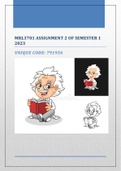MRL3701 ASSIGNMENT 2 OF SEMESTER 1
2023
UNIQUE CODE: 791956
, Assignment 02
QUESTION:
You are a candidate attorney at a law firm in the process of consulting a client, Mr.
Masuku. He informs you that he bought a vehicle from one Mr. Havenga, who makes a
living by buying and selling secondhand cars. He further informs you that the trustee of
Mr. Havenga however approached him (Mr. Masuku), took back the vehicle that he
bought from Mr. Havenga and informed him that he is claiming the vehicle under section
29 of the Insolvency Act 24 of 1936. Mr. Masuku now seeks your advice on how to get the
vehicle back.
During your research, you find that dispositions which may be set aside, include those not
made for value, voidable preferences, undue preferences, collusive dealings, and those
made in fraud of creditors.
1. Which of the dispositions above may be set aside in terms of the common law, and
what is the relevant action that may be used to set the disposition aside? (2)
2. What must the trustee prove to set aside a disposition made for no value? (2)
3. Regarding the factual scenario above, advise your client what a section 29
disposition is, state whether there is an exception to section 29 that may protect
him, and what that exception is. Lastly state which test is applied to determine
whether the exception applies. (3)
4. State whether the following statement is true or false and provide a motivation for
your answer: Referring to Collusive Dealings, ‘collusion’ in terms of section 31(1) of
the Insolvency Act refers to any agreement with the results that one creditor is
preferred over another.
1





